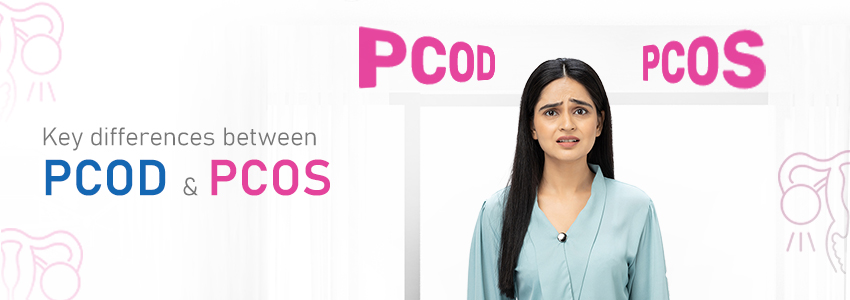

If you've ever heard the terms PCOD and PCOS, you might have thought they were the same thing. Honestly, even many of us confuse the two. But the truth is- though they're related, they have differences. Both affect the ovaries, both are tied to female hormones, but the way they show up in your body and the long-term impact can be quite different.
So, let's break it down in a simple way
PCOD stands for Polycystic Ovarian Disease. In simple words, your ovaries produce more immature eggs than usual, and instead of being released, they end up turning into small cysts. Though it sounds scary, it is quite common in women. It can cause different side-effects but is not that serious.
Doctors say PCOD is mainly a hormonal imbalance that can cause things like irregular periods, weight gain, acne, or unwanted hair growth. The good news is, it's usually manageable. With a few lifestyle changes such as healthy eating habits, exercise routine and good sleep routine, many women see huge improvements. In some cases, doctor can prescribe you a few medications to improve your hormonal health. And the best part? PCOD doesn't always stick around forever and can be cured.
Now PCOS, or Polycystic Ovary Syndrome, is a bit more complicated. Doctors call it a metabolic and hormonal disorder, which basically means it messes with more than just your ovaries.
In PCOS, your ovaries start producing higher levels of androgens (male hormones). That's why women with PCOS often notice things like excess facial or body hair, acne that refuses to leave, weight gain that's hard to control, and sometimes, it can lead to fertility struggles.
Unlike PCOD, PCOS comes with bigger concerns-this doesn't just affect your menstrual cycle or skin, it increases your risk of long-term issues including type 2 diabetes, high blood pressure, and heart disease. So, compared to PCOD, PCOS is more aggressive and needs closer medical care as only lifestyle changes don't work much.
The tricky part is that PCOD and PCOS share a lot of the same symptoms. Let's look at them side by side.
In short, PCOD is like your body giving you a warning sign, while PCOS is your body wanting serious medical help.
A lot of women treat irregular cycles, mild weight gain, or acne as normal problems. But doctors stress that these could be early symptoms of PCOD or PCOS. And ignoring them only delays treatment.
The difference is important because PCOS, in particular, has more serious effects-it can affect your fertility, mental health, and overall long-term health. PCOD, while generally not that serious, can also get worse if not treated.
So, knowing whether it is PCOD or PCOS will help you and your doctor figure out the right approach to cure the issue.
Both conditions are manageable once you know what you're dealing with. With right guidance, it is possible to deal with both
PCOD and PCOS may sound similar, but they're not the same. PCOD is usually lighter, often linked to lifestyle, and can get better with healthy habits. PCOS is more serious-it affects your whole body, not just your ovaries, and usually needs medical care along with lifestyle changes.
The main thing to remember? Don't ignore the signs. Irregular periods, stubborn acne, or sudden weight changes aren't just "normal". They're your body's way of asking for attention. The sooner you see a doctor, the easier it is to manage-and the better it is for your long-term health.
If you are facing any of the above-mentioned symptoms, do not brush them off and talk to an expert. You can make your appointment with Abha Surgy Centre online or you can also call us on +91- 9831471220.
Remember - with right care, you can live a healthy life, and our woman health experts are always there to help you out.